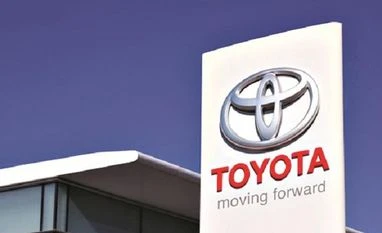Toyota Motor ’s quarterly profit exceeded estimates as improvements in supply of semiconductors and a weak yen helped it capitalise on a global rebound in demand for vehicles. The stock closed at a record high.
Operating profit for the three months through June was a record ¥1.1 trillion ($7.7 billion), the world’s No. 1 carmaker said in a statement Tuesday. That compared with ¥880 billion projected by analysts. Toyota kept its outlook for operating income for the fiscal year at ¥3 trillion.
Demand for automobiles is robust following the pandemic downturn, prompting carmakers to boost production and raise prices. Toyota made and sold a record number of vehicles in June. It is also on track to increase production between August and October, according to recent reports.
“When considering exchange rates, production and the market environment, Toyota keeping its outlook was a bit of a surprise,” Bloomberg Intelligence analyst Tatsuo Yoshida said.
Net sales for the fiscal first quarter rose 24 per cent to ¥10.6 trillion, topping the prediction for ¥9.8 trillion. For the full year, Toyota kept the revenue outlook at ¥38 trillion.
The company’s shares rose 2.5 per cent in Tokyo, building on Monday’s 3.3 per cent gain to reach ¥2,445.5 — a record based on data compiled by Bloomberg going back to 1974. The share price reflects a f
More From This Section
ive-for-one stock split in October 2021.
Toyota said it was able to command higher prices for vehicles, helping to “reduce the impact of the sharp rise in materials prices.”
Japanese carmakers’ sales in 2023 could rise 19 per cent domestically and 18 per cent in the US, but fall 4 per cent in China, according to Yoshida.
“Toyota’s declining business in China is a point of concern,” he said. “The impact is industrywide but concerning for a firm like Toyota.”
Toyota announced plans to strengthen its competitiveness in China by, among other things, accelerating the development of an electric powertrain with its two biggest suppliers, Denso and Aisin.
As pressure builds on manufacturers to phase out fossil fuels and embrace the shift to electric vehicles, Toyota has promised to expand EV production while continuing to offer a broad selection of hybrid and gasoline cars.
Soon after former Lexus head Koji Sato became chief executive officer, the company pledged to sell 1.5 million battery EVs annually by 2026. Further out, it has promised to sell 3.5 million by 2030, halve its carbon dioxide emissions by 2035 and become carbon neutral by 2050.
In May, Sato said Toyota would produce 200,000 BEVs this fiscal year. He also said it would invest ¥3.1 trillion on sustainable growth, including efforts to decarbonise and electrify.
)